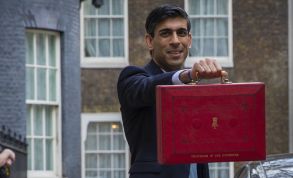Spending review must address urgent health issues, chancellor warned
Mr Sunak (pictured) said the review would conclude in late November and would be for just one year. He insisted the decision was taken to help the government prioritise its response to Covid-19 and focus on supporting jobs.
The spending review will now set most department resource and capital budgets for 2021/22, as well as the block grant for the devolved administrations. However, multi-year resource spending for the NHS and schools will be fully funded, together with priority infrastructure projects.
The spending review will focus on three areas – giving departments the certainty they need to tackle Covid; supporting public services to provide first class public services; and investing in infrastructure. Mr Sunak reiterated the review would confirm multi-year capital funding for key programmes where certainty is needed. Earlier this month, the prime minister announced £3.7bn of funding over the next four years for Health Infrastructure Plan projects.
The chancellor said it was essential to provide certainty in the current environment. ‘Long-term investment in our country’s future is the right thing to do, especially in areas which are the cornerstone of our society like the NHS, schools and infrastructure. We’ll make sure these areas crucial to our economic recovery have their budgets set for further years so they can plan and help us build back better.’
Victor Adebowale, chair of the NHS Confederation, said the one-year spending review was understandable given the impact of the pandemic. However, though the NHS in England has a funding settlement until 2023/24, it was vital it was revised due to the impact of Covid-19.
‘The NHS is now facing significant extra costs as a result of the pandemic, and we are staring down the barrel of lengthening waiting lists while having reduced capacity due to the need for infection control measures. Put simply, the pandemic has driven a coach and horses through the current funding settlement, and it needs to be looked at again,’ Lord Adebowale said.
Other areas of health funding have not been settled over the long term, including capital, workforce and public health, together with social care. Funding was needed to help address health inequalities.
He added: ‘The chancellor will also need to address the vast areas of expenditure on health and care that have not been dealt with – and which were always planned to be dealt with in the comprehensive spending review. At the top of the list is delivering a multi-year capital funding settlement so that we can urgently upgrade old buildings and invest in new digital technology and infrastructure. Current plans in this area mainly focus on hospitals, but we know that mental health, community services and GP premises are also badly in need of upgrading.’
King’s Fund chief analyst Siva Anandaciva said: ‘Setting one-year budgets is understandable given the economic uncertainty, but there is a significant cost to delaying decisions in areas such as workforce and capital investment.
‘NHS England’s budget is already fixed until 2024, as set out in the NHS Funding Bill, and today’s announcement gives no further certainty to address the longer-term problems of the crumbling NHS estate and overstretched workforce. These areas need multi-year certainty, as it takes many years to train healthcare professionals, and to repair or rebuild facilities. Demand for healthcare will continue to increase, and failing to invest now risks creating further problems down the line.’
Related content
We are excited to bring you a fun packed Eastern Branch Conference in 2025 over three days.
This event is for those that will benefit from an overview of costing in the NHS or those new to costing and will cover why we cost and the processes.